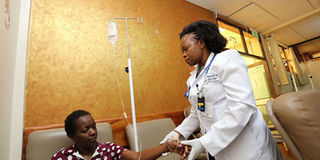As with patients, mind caregivers’ welfare

A cancer patient being attended to by a clinical oncologist at Texas Cancer Centre on July 18, 2017. Cancer is the third-highest cause of death in Kenya. PHOTO | FILE | NATION MEDIA GROUP
What you need to know:
- Caregivers are often faced with trauma and they need as much psychological, emotional and spiritual support as humanly possible.
- They should also take care of themselves; one is of better help to others when in good health and healthy state of mind.
Cancer diagnosis is shocking and sudden.
You wake up one day and your loved one complains of being unable to use their hand; the next moment they are unable to speak; you take them for a local medical check-up only to be diagnosed with stroke.
You immediately book them for physiotherapy and, after many sessions, you are told the treatment is not working.
It is at this stage that you are referred to an oncologist, where your journey with cancer begins. You then sort out your money issues — including consulting your insurance provider, if at all you have a policy — and your loved one is admitted. The admission is immediately followed by tests like MRI and CT-Scan.
The next day, results are out and you are told your relative has stage four cancer and you are required to make an urgent decision on a treatment plan.
Where do you start? You probably have other close family members who are as clueless.
DECISION-MAKING
This is a typical example of how every caregiver receives news about a cancer diagnosis. One is required to make urgent decisions with little or no information.
The only information they receive is what the doctor shares with them and they are required to believe and move on as soon as possible.
Doctors do a great job and give factual and proper information for the benefit of their patients and caregivers. The problem is at the sensitisation level.
The ordinary 28-year-old who went through the 8-4-4 system has not encountered cancer or mental health in the curriculum.
Almost every family is affected by cancer. It is the third-highest cause of death in Kenya (seven per cent of all deaths per year) after infectious and cardiovascular diseases.
TRAINING
This therefore means that there is no way we are going to run away from this tragedy and we need to address it now.
Doing so will also move us an inch closer to achieving goal three of the Sustainable Development Goals (SDGs), which is attaining good health and well-being for all.
Caregivers play a very important role — from cleaning, cooking, helping the patient to move around to becoming their therapist and spiritual guide.
But most have no idea what to do when their loved ones are faced with such diagnoses, which mainly happens too late.
Palliative care training is key to caregivers. Some people are faced with very hard realities and are left to take care of a relative with such little knowledge, which affects them mentally as they see their loved one deteriorate. Some are left with a huge financial burden with minimal options.
CAREGIVERS
I have to mention that those friends who pop up to visit caregivers with adult diapers, household shopping and encouraging words have a special place in Heaven.
When you hear your friend, colleague or relative has been affected, that is not the time to distance yourself from them. At this point, as simple a phrase as: “It is tough but all will be well” goes a long way in easing pain.
Caregivers are often faced with trauma and they need as much psychological, emotional and spiritual support as humanly possible.
And, they should also take care of themselves; one is of better help to others when in good health and healthy state of mind.
Ms Victoria, communications consultant at P&L Consulting, is a youth advocate. [email protected]





